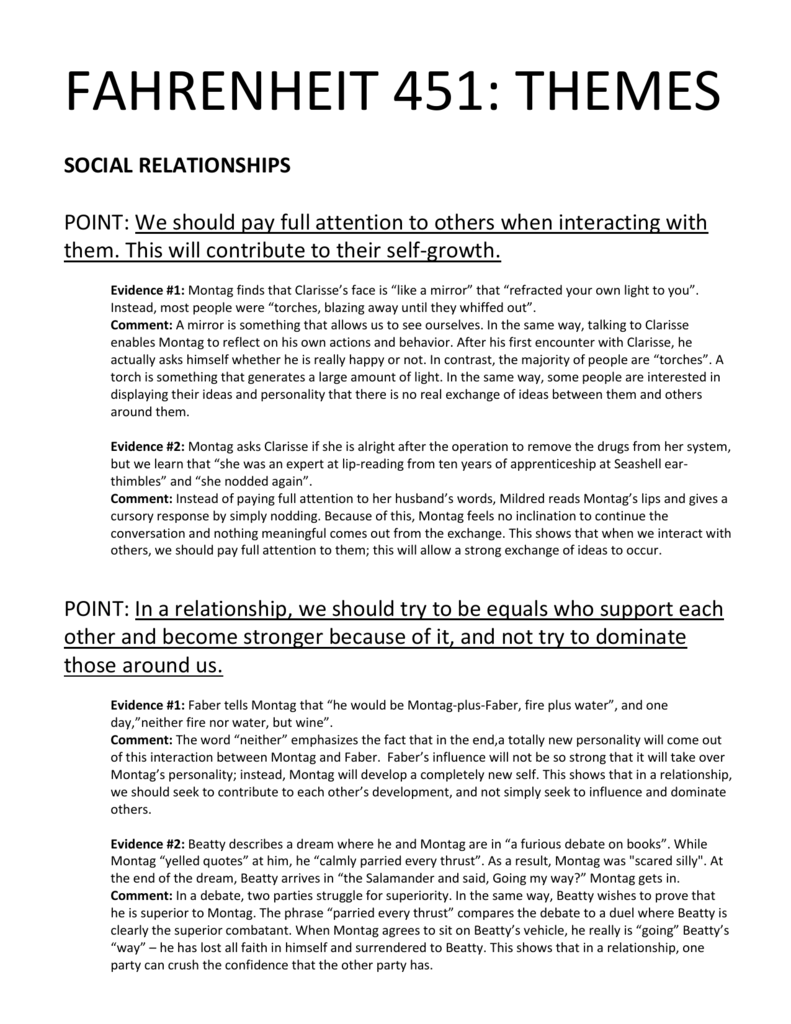Fahrenheit 451 Themes: Exploring The Burning Issues Of Ray Bradbury's Masterpiece
**Let’s talk about Fahrenheit 451 themes, folks! This book isn’t just a story; it’s a mirror reflecting the deep-seated fears and flaws of society. Written by Ray Bradbury in 1953, Fahrenheit 451 is a dystopian masterpiece that has stood the test of time, resonating with readers across generations. It’s more than a novel; it’s a wake-up call. So, buckle up, because we’re diving deep into the burning themes that make this book an iconic piece of literature.**
Now, here’s the deal—Fahrenheit 451 isn’t just about firemen burning books. It’s about the suppression of ideas, the power of knowledge, and the dangers of conformity. Bradbury painted a bleak picture of a world where books are forbidden, and critical thinking is a crime. But why? Why did he choose to explore these themes? That’s what we’re here to uncover today.
Before we dive into the thick of it, let me set the stage. Fahrenheit 451 is more relevant now than ever before. In a world where information is at our fingertips, yet truth is often distorted, Bradbury’s warnings feel eerily prescient. This book isn’t just a fictional tale—it’s a reflection of our own reality. Let’s explore the themes that make Fahrenheit 451 such a powerful and thought-provoking work.
Read also:Captivating Psn Network Names Your Ultimate Guide To Standing Out
Table of Contents
- Censorship and the Suppression of Ideas
- The Power of Knowledge
- Conformity vs. Individuality
- The Dangers of Technology
- The Role of Media
- The Importance of Memory
- Alienation and Loneliness
- The Fragility of Society
- Hope and Resistance
- Human Nature and the Desire for Truth
Censorship and the Suppression of Ideas
Why Censorship Matters
Let’s kick things off with the big one: censorship. In Fahrenheit 451, books are banned because they challenge the status quo. The government doesn’t want people to think critically or question authority. Instead, they promote mindless entertainment and superficial happiness. But here’s the kicker—censorship doesn’t just happen in the pages of a dystopian novel. It’s a real issue that affects societies worldwide.
Think about it. When we suppress ideas, we limit our ability to grow and evolve as a species. Bradbury was warning us about the dangers of living in a world where dissenting voices are silenced. In today’s world, where misinformation spreads like wildfire, his message feels more urgent than ever.
The Power of Knowledge
Knowledge is Power, Right?
Bradbury believed that knowledge was the key to freedom. In Fahrenheit 451, books are symbols of wisdom and enlightenment. They contain the truths and ideas that society fears the most. But why are books so powerful? Because they encourage us to think, question, and explore new perspectives.
Here’s the thing: knowledge isn’t just about facts and figures. It’s about understanding the world around us and our place in it. In a world where ignorance is bliss, Bradbury reminds us that ignorance is also dangerous. Without knowledge, we’re vulnerable to manipulation and control.
Read also:How Old Is Sadie Mckenna A Deep Dive Into The Rising Stars Life And Career
Conformity vs. Individuality
Being Different in a Uniform World
One of the most compelling Fahrenheit 451 themes is the tension between conformity and individuality. In Bradbury’s dystopian society, people are encouraged to conform to societal norms. Individuality is seen as a threat to the stability of the state. But what happens when we all think the same way? We lose our ability to innovate, create, and challenge the status quo.
Bradbury was warning us about the dangers of living in a world where everyone looks, thinks, and acts the same. In today’s world, where social media often promotes conformity, his message is more relevant than ever. Being true to yourself isn’t just important—it’s essential.
The Dangers of Technology
When Tech Goes Wrong
Fahrenheit 451 also explores the dangers of technology. In Bradbury’s world, technology is used to control and manipulate people. From the giant TV walls to the mechanical hounds, technology serves as a tool of oppression rather than liberation. But here’s the twist—Bradbury wasn’t anti-tech. He was warning us about the potential misuse of technology.
In today’s world, we’re surrounded by technology. It’s everywhere we look. But are we using it responsibly? Or are we letting it control us? Bradbury’s warnings about the dangers of technology are more relevant now than ever before.
The Role of Media
Media as a Weapon
Media plays a crucial role in Fahrenheit 451. In Bradbury’s world, media is used to distract and manipulate the masses. Instead of promoting critical thinking, it promotes superficial entertainment. Sound familiar? In today’s world, media often prioritizes clicks over substance. We’re bombarded with sensational headlines and clickbait articles, while important issues are ignored.
Bradbury was warning us about the dangers of living in a world where media is used as a tool of control. In a world where fake news is a real problem, his message feels more urgent than ever.
The Importance of Memory
Remembering the Past
Memory is another important theme in Fahrenheit 451. In Bradbury’s world, people are encouraged to forget the past. History is rewritten, and inconvenient truths are erased. But why is memory so important? Because it helps us learn from our mistakes and avoid repeating them.
Bradbury reminds us that forgetting the past is dangerous. Without memory, we lose our ability to grow and evolve as a society. In today’s world, where history is often distorted or ignored, his message is more relevant than ever.
Alienation and Loneliness
Feeling Alone in a Crowded World
Alienation and loneliness are recurring themes in Fahrenheit 451. In Bradbury’s world, people are disconnected from each other. They spend their days glued to screens, consuming mindless entertainment. But here’s the thing—being surrounded by people doesn’t mean you’re not lonely.
Bradbury was warning us about the dangers of living in a world where human connection is undervalued. In today’s world, where social media often replaces real-life interactions, his message feels more relevant than ever.
The Fragility of Society
When Everything Falls Apart
Fahrenheit 451 also explores the fragility of society. In Bradbury’s world, the government maintains control by keeping people distracted and ignorant. But what happens when the system starts to crumble? When people realize they’ve been living a lie? The answer isn’t pretty.
Bradbury was warning us about the dangers of living in a society that prioritizes control over freedom. In today’s world, where political and social systems are under constant strain, his message feels more urgent than ever.
Hope and Resistance
Fighting Back Against the System
Despite the bleakness of Fahrenheit 451, there’s a glimmer of hope. In the face of oppression, there are those who resist. People like Montag and Faber refuse to accept the status quo. They fight back against the system, even when the odds are stacked against them.
Bradbury reminds us that hope is a powerful thing. Even in the darkest of times, there’s always a chance for change. In today’s world, where resistance movements are gaining momentum, his message feels more inspiring than ever.
Human Nature and the Desire for Truth
Why We Seek the Truth
Finally, let’s talk about human nature and the desire for truth. In Fahrenheit 451, the characters are driven by a deep need to understand the world around them. They crave knowledge, even when it’s dangerous. But why? Because the truth sets us free. It allows us to see the world as it really is, rather than how others want us to see it.
Bradbury reminds us that the desire for truth is a fundamental part of human nature. Even in a world where lies are more convenient, the truth always finds a way to surface. In today’s world, where misinformation is rampant, his message feels more important than ever.
Conclusion
So, there you have it—Fahrenheit 451 themes in a nutshell. From censorship to the power of knowledge, Bradbury’s masterpiece explores some of the most pressing issues of our time. But here’s the thing—this book isn’t just about the past or the future. It’s about the present. It’s about the choices we make every day and the world we’re creating for future generations.
So, what can we do? We can start by valuing knowledge, embracing individuality, and questioning the status quo. We can resist the forces that seek to control and manipulate us. And most importantly, we can remember the lessons of Fahrenheit 451. Because in the end, the truth will set us free.
Now, it’s your turn. What do you think about Fahrenheit 451 themes? Do you see parallels between the book and our world today? Let me know in the comments below. And if you enjoyed this article, don’t forget to share it with your friends. Together, we can keep the conversation going!
Article Recommendations


